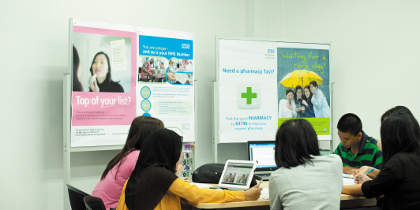
December 5, 2013, by Teaching at Nottingham
The new Nottingham Pharmacy degree: a dual campus venture
Cristina de Matteis: “In September 2012 we launched our new four year pharmacy (MPharm) degree in Nottingham and Malaysia; the culmination of more than 3 years of planning, innovation, design and implementation. This degree is a radically new approach to the education of pharmacists and meets the new General Pharmaceutical Council (GPhC) standards [1]. Here we describe some of our experiences from this process.
Our approach to modernising the pharmacy curriculum
“The new GPhC standards for the initial training of pharmacists arose from the Modernising Pharmacy Education agenda of Health Education England and the NHS, and mandate a significantly greater clinical education and training. The Nottingham School of Pharmacy has always had a reputation for providing the strongest of scientific educations, and we were determined to bring these two skill-sets together to provide a unique and unparalleled pharmacy education, ensuring the success and employability of our graduates for many years to come.
“Our aim was to create a completely new degree programme and to involve pharmacy alumni, stakeholders, international pharmacy educators, and Nottingham and UNMC–based academic staff in this process, including staff from the School of Life Sciences (SLS) who co-deliver the pharmacy degree at Nottingham and UNMC. To achieve this, early in the process a stakeholder panel was set-up and regular meetings ensured our understanding of the aspirations and requirements of future employers and the capture of their views and ideas. Pharmacy alumni events ensured the input of our pharmacy graduates into this creative process. Contacts and visits were made to international Pharmacy schools with outstanding reputations for education and innovation, and the Course Development Team was created, comprising seven members of experienced teaching staff across both campuses, including colleagues from SLS, who were tasked with leading the course development. We were also keen to better understand and support the school-to-university transition experience of our students, and we met with many teachers and Heads of Science in schools and sixth-form colleges to develop new ideas in this area.
Leadership and team work across two campuses
“A dual model of creativity was implemented early on, involving a combination of strong leadership from the Heads of Schools and the Course Development Team (at Nottingham and UNMC), together with strong partnership involving all members of staff. An iterative process of wide staff involvement and consultation, followed by the focussing and prioritising of ideas by the Course Development Team, was the cornerstone of the course development process. Indeed, this dual approach was recognised and commended by the GPhC during their accreditation of the new MPharm programme in April 2012. Staff away days facilitated by experienced mediators allowed staff to share ideas. Providing staff with a forum to voice and explore their fears of the substantial changes that the new course would bring was a powerful force for engaging and bringing staff together. All academic staff are now involved in the development and delivery of the new course.
Innovation in teaching and learning
“Innovative themes included the integration of science into clinical practice and the use of e-learning for which the School had substantial University support. A University Teaching Development Fund grant supported the development of the first integrated disease focused module entitled “Dyspepsia”, including the implementation of varied e-learning platforms in this module, and the production of visually-rich interactive clinical case-studies (Fig 1). Regular meetings with e-learning experts in LRLR were key to the successful development and implementation of these tools. The University also supported a second bid to use iPads to display the clinical case-studies, in small group problem-based workshops. We found that these mobile devices were powerful tools for encouraging students to work together in small groups (Fig 2), and as a result of this success the School will now roll out this approach across three years of the degree. An extensive programme of capturing student views and feedback about the new first year was carried out, and is now being used in the course development process. We would like to thank our Nottingham and UNMC-based students for their generous, mature and considered contributions to this process, and the University for its appreciable support.”
For more information, please contact:
Dr Stephanie Allen (Director of Teaching and Learning, School of Pharmacy).
This article was compiled by Cristina De Matteis after conversation with colleagues in
the School.
Edited by CDM after conversations with colleagues in the School.
[1] General Pharmaceutical Council, Future pharmacists: standards for the initial
education and training of pharmacists. London, General Pharmaceutical Council, May 2011.
No comments yet, fill out a comment to be the first

Leave a Reply